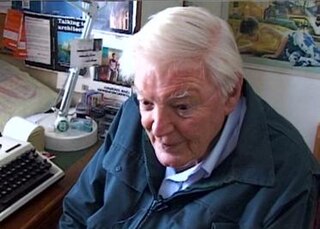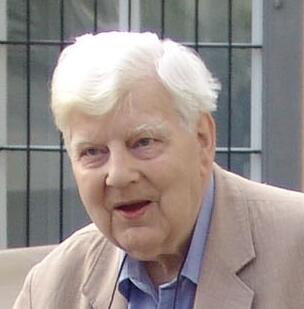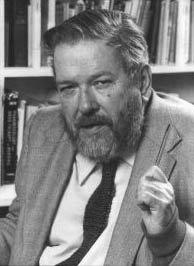Related Research Articles

Colin Ward was a British anarchist writer and editor. He has been called "one of the greatest anarchist thinkers of the past half century, and a pioneering social historian."

Sir Michael Anthony Eardley Dummett was an English academic described as "among the most significant British philosophers of the last century and a leading campaigner for racial tolerance and equality." He was, until 1992, Wykeham Professor of Logic at the University of Oxford. He wrote on the history of analytic philosophy, notably as an interpreter of Frege, and made original contributions particularly in the philosophies of mathematics, logic, language and metaphysics.

George Parkin Grant was a Canadian philosopher, university professor and social critic. He is known for his Canadian nationalism, a political conservatism that affirms the values of community, equality and justice and his critical, philosophical analysis of the social and political effects of limitless technological progress. As a practising Christian, Grant conceived of time as the moving image of an eternal order illuminated by love.

Stanley Louis Cavell was an American philosopher. He was the Walter M. Cabot Professor of Aesthetics and the General Theory of Value at Harvard University. He worked in the fields of ethics, aesthetics, and ordinary language philosophy. As an interpreter, he produced influential works on Wittgenstein, Austin, Emerson, Thoreau, and Heidegger. His work is characterized by its conversational tone and frequent literary references.
Early modern philosophy The early modern era of philosophy was a progressive movement of Western thought, exploring through theories and discourse such topics as mind and matter, is a period in the history of philosophy that overlaps with the beginning of the period known as modern philosophy. It succeeded the medieval era of philosophy. Early modern philosophy is usually thought to have occurred between the 16th and 18th centuries, though some philosophers and historians may put this period slightly earlier. During this time, influential philosophers included Descartes, Locke, Hume, and Kant, all of whom contributed to the current understanding of philosophy.

Mary Beatrice Midgley was a British philosopher. A senior lecturer in philosophy at Newcastle University, she was known for her work on science, ethics and animal rights. She wrote her first book, Beast and Man (1978), when she was in her late fifties, and went on to write over 15 more, including Animals and Why They Matter (1983), Wickedness (1984), The Ethical Primate (1994), Evolution as a Religion (1985), and Science as Salvation (1992). She was awarded honorary doctorates by Durham and Newcastle universities. Her autobiography, The Owl of Minerva, was published in 2005.

Carl Gustav "Peter" Hempel was a German writer, philosopher, logician, and epistemologist. He was a major figure in logical empiricism, a 20th-century movement in the philosophy of science. Hempel articulated the deductive-nomological model of scientific explanation, which was considered the "standard model" of scientific explanation during the 1950s and 1960s. He is also known for the raven paradox and Hempel's dilemma.

Frank Cameron JacksonFBA is an Australian analytic philosopher and Emeritus Professor in the School of Philosophy at Australian National University (ANU) where he had spent most of the latter part of his career. His primary research interests include epistemology, metaphysics, meta-ethics and the philosophy of mind. In the latter field he is best known for the "Mary's room" knowledge argument, a thought experiment that is one of the most discussed challenges to physicalism.

Judith Jarvis Thomson was an American philosopher who studied and worked on ethics and metaphysics. Her work ranges across a variety of fields, but she is most known for her work regarding the thought experiment titled the trolley problem and her writings on abortion. She is credited with naming, developing, and initiating the extensive literature on the trolley problem first posed by Philippa Foot which has found a wide range use since. Thomson also published a paper titled "A Defense of Abortion", which makes the argument that the procedure is morally permissible even if it is assumed that a fetus is a person with a right to life.

Joseph Raz was an Israeli legal, moral and political philosopher. He was an advocate of legal positivism and is known for his conception of perfectionist liberalism. Raz spent most of his career as a professor of philosophy of law at Balliol College, Oxford, and was latterly a part-time professor of law at Columbia University Law School and a part-time professor at King's College London. He received the Tang Prize in Rule of Law in 2018.
Ernan McMullin was an Irish philosopher who last served as the O’Hara Professor of Philosophy Emeritus at the University of Notre Dame. He was an internationally respected philosopher of science who has written and lectured extensively on subjects ranging from the relationship between cosmology and theology, to the role of values in understanding science, to the impact of Darwinism on Western religious thought. He is the only person to ever hold the presidency of four of the major US philosophical associations. He was an expert on the life of Galileo.

Wolfgang Smith was an Austrian mathematician, physicist, philosopher of science, metaphysician, and member of the Traditionalist School. He wrote extensively in the field of differential geometry, as a critic of scientism and as a proponent of a new interpretation of quantum mechanics that draws heavily from premodern ontology and realism.

Barry Stroud was a Canadian philosopher and professor at the University of California, Berkeley. Known especially for his work on philosophical skepticism, he wrote about David Hume, Ludwig Wittgenstein, the metaphysics of color, and many other topics.
Roger Davis Masters studied at Harvard, served in the U.S. Army (1955–57), completed his M.A. (1958) and Ph.D. (1961) at the University of Chicago, and served on the faculty at Yale (1961-67) and then Dartmouth College, with a two-year leave to serve as Cultural Attaché at the American Embassy in Paris (1969–1971). From his retirement in 1998 he was the Nelson A. Rockefeller Professor of Government Emeritus in the Department of Government at Dartmouth.
Transcendental humanism in philosophy considers humans as simultaneously the originator of meaning, and subject to a larger ultimate truth that exists beyond the human realm (transcendence). The philosophy suggests that the humanistic approach is guided by "accuracy, truth, discovery, and objectivity" that transcends or exists apart from subjectivity.
Neo-Marxism is a collection of Marxist schools of thought originating from 20th-century approaches to amend or extend Marxism and Marxist theory, typically by incorporating elements from other intellectual traditions such as critical theory, psychoanalysis, or existentialism. Neo-Marxism comes under the broader framework of the New Left. In a sociological sense, neo-Marxism adds Max Weber's broader understanding of social inequality, such as status and power, to Marxist philosophy.
Maurice Cranston wrote a three-volume biography of the philosopher Jean-Jacques Rousseau, published between 1983 and 1998.

Rousseau, Nature, and the Problem of the Good Life is a 1999 analysis of Jean-Jacques Rousseau's works, written by Laurence D. Cooper.

Alan Richard White was an analytic philosopher who worked mainly in epistemology, the philosophy of mind, and, latterly, legal philosophy. Peter Hacker notes that he was "the most skillful developer of Rylean ... ideas in philosophical psychology" and that "if anyone surpassed Austin in subtlety and refinement in the discrimination of grammatical differences, it was White." Richard Swinburne remarks that "during the heyday of 'ordinary language philosophy' no tongue practised it better."
Dutch philosophy is a broad branch of philosophy that discusses the contributions of Dutch philosophers to the discourse of Western philosophy and Renaissance philosophy. The philosophy, as its own entity, arose in the 16th and 17th centuries through the philosophical studies of Desiderius Erasmus and Baruch Spinoza. The adoption of the humanistic perspective by Erasmus, despite his Christian background, and rational but theocentric perspective expounded by Spinoza, supported each of these philosopher's works. In general, the philosophy revolved around acknowledging the reality of human self-determination and rational thought rather than focusing on traditional ideals of fatalism and virtue raised in Christianity. The roots of philosophical frameworks like the mind-body dualism and monism debate can also be traced to Dutch philosophy, which is attributed to 17th century philosopher René Descartes. Descartes was both a mathematician and philosopher during the Dutch Golden Age, despite being from the Kingdom of France. Modern Dutch philosophers like D.H. Th. Vollenhoven provided critical analyses on the dichotomy between dualism and monism.
References
- ↑ Jimack, Peter (January 2001). "Rousseau , by Timothy O'Hagan". Journal of the British Society for Phenomenology. 32 (2): 205–207. doi:10.1080/00071773.2001.11007330. ISSN 0007-1773.
- ↑ Martin, Wayne M. (27 August 2009). "Review of Rousseau's Theodicy of Self-Love: Evil, Rationality, and the Drive for Recognition". NDPR. ISSN 1538-1617.
- ↑ Igrek, Apple Zefelius (2006). "Review of Rousseau (Arguments of the Philosophers series), by Timothy O'Hagan". Essays in Philosophy. 7 (1): 111–113. doi:10.5840/eip20067124.
- ↑ Bertram, Christopher (2001). "Review of Rousseau". History of Political Thought. 22 (1): 186–188. ISSN 0143-781X. JSTOR 26219829.
- ↑ Minel, Emmanuel (1989). "Review of The End of Law ?". Actuel Marx (5): 172–175. ISSN 0994-4524. JSTOR 45299687.
- ↑ Holmes, Stephen (April 1986). "The End of Law? Timothy O'Hagan". Ethics. 96 (3): 645–646. doi:10.1086/292787. ISSN 0014-1704.
- ↑ Green, Leslie (1985). "Legality and Community". Oxford Journal of Legal Studies. 5 (3): 463–470. doi:10.1093/ojls/5.3.463. ISSN 0143-6503.
- ↑ Nelken, David (April 1986). "Beyond the Study of "Law and Society"? Henry's Private Justice and O'Hagan's The End of Law?". American Bar Foundation Research Journal . 11 (2): 322–338. doi:10.1111/j.1747-4469.1986.tb00245.x. ISSN 0361-9486.